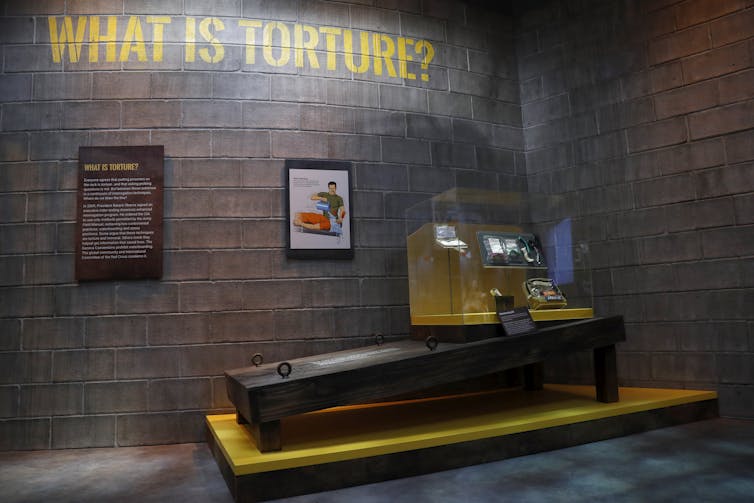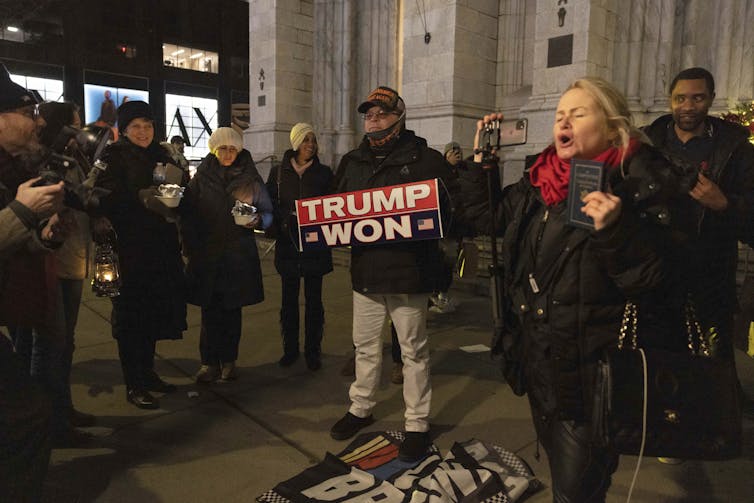The techniques of denial and distraction that politicians use to manage scandal
On September 28, 2022, the US House of Representatives special committee investigating the January 6, 2021 riot will hold another public hearing – likely the last before releasing its official report.
Through previous hearings this past summer, the committee has revealed how former President Donald Trump and close associates propagated the “big lie” of a stolen election. The hearings have also revealed how Trump stoked the anger of protesters who marched to the US Capitol and then refused to act as they breached the building.
The hearings were broadcast in prime time and dominated news cycles. Still, a poll conducted by Monmouth University in August found that about 3 in 10 Americans still believe Trump “didn’t do anything wrong about January 6.”
As a sociologist studying denial, I analyze how people ignore plain truths and use rhetoric to persuade others to deny them as well. Politicians and their media allies have long used this rhetoric to deal with scandals. The reactions of Trump and his supporters to the Jan. 6 investigation are no exception.
stages of denial
Traditionally, people think of denial as a state of being: one is “in denial” when they reject obvious truths. However, denial is also the language of strategies people use to downplay and evade responsibility for their wrongdoing.
These strategies are remarkably adaptable. They were used by both political parties to deal with completely different scandals. Despite this, the strategies tend to be deployed in fairly predictable ways. Because of this, we can often see scandals unfold through clear bouts of denial.
In my previous research on denial and US torture, I analyzed how the George W. Bush administration and supporters in Congress adjusted their forms of denial as new allegations and evidence of abuses in the global “war on terror” emerged .
For example, after photos of torture at Abu Ghraib prison in Iraq were published in spring 2004, Abu Ghraib was described as a deplorable but isolated incident. At the time, there was no serious public evidence of mistreatment of inmates at other US institutions.
Subsequent revelations about the use of torture at Guantánamo Bay and secret CIA sites changed things. The Bush administration could no longer claim that torture was an isolated case. Officials also faced allegations that they directly and knowingly authorized torture.

AP Photo/Jacquelyn Martin
Faced with these allegations, Bush and his supporters began to justify and downplay torture. For many Americans, torture that was once deplorable has been rebranded as an acceptable tool of national security: “enhanced interrogation.”
As the debate over torture shows, political responses to scandals often begin with outright denial. But they rarely end there. When confronted with credible evidence of political wrongdoing, politicians often attempt other forms of denial. Instead of saying that allegations are untrue, they may downplay the seriousness of allegations, justify their behavior, or try to distract from it.
It’s not just Republican governments that use denial in this way. When the Obama administration could no longer fully deny civilian casualties from drone strikes, it downplayed them. In a 2013 national security speech, President Barack Obama contrasted drone strikes with the use of “conventional airborne forces or missiles,” which he described as “far less precise.” He also justified drone strikes by arguing that “doing nothing in the face of terrorist networks would result in far more civilian casualties.”
Scandal strategies in the game
Americans followed the January 6 riot on TV and social media as it happened. Given the liveliness of the day, outright denials of the insurgency are particularly far-fetched and marginal — though they exist. For example, some Trump supporters have claimed that left-wing “Antifa” groups raided the Capitol — a claim many rioters have themselves denied.
Some of Trump’s supporters in Congress and in the media have repeated claims that the riot was staged to discredit Trump. But given Trump’s own vocal support for the insurgents, supporters typically deploy more nuanced denials to downplay the day’s events.
So what happens when outright rejection fails? From ordinary citizens to political elites, people often respond to allegations by “condemning the judges,” accusing their accusers of exaggerating — or doing worse themselves, a strategy known as “favorable comparisons.”
Together, these two strategies portray those making allegations as untrustworthy or hypocritical. As I show in my new book on denial, these are standard denials by scandal managers.
“Condemnation of the Convicts” and “Favorable Settlements” were also at the heart of efforts to minimize the January 6 uprising. Some critics of the committee downplay the uprising, comparing it to the Black Lives Matter protests, although the vast majority were peaceful.
“For months our cities burned, police stations burned, our businesses were destroyed. And they said nothing. Or they cheered for it. And they raised money for it. And they let it happen in the greatest country in the world,” Republican Rep. Matt Gaetz said during Trump’s second impeachment. “Now some have cited the metaphor that the President lit the flames. Well, they lit real flames, real fires!”
Similar comparisons surfaced again during the Representatives Committee hearings. One NFL coach called Jan. 6 a “cloud of dust” compared to the Black Lives Matter protests.
These forms of denial do several things at once. They divert attention from the original focus of the scandal. They minimize Trump’s role in inciting the January 6 violence by claiming that Democrats are inciting even more destructive forms of violence. And they discredit the investigation by suggesting that its leaders are hypocrites more interested in scoring political points than curbing political violence.

AP Photo/Yuki Iwamura
trickle-down denial
These denials fail to affect the majority of Americans. Nevertheless, they are momentous. Denial seeps through by providing ordinary citizens with scripts to talk about political scandals. Denials also reinforce beliefs and allow people to filter out information that contradicts what they believe to be true. In fact, ordinary Americans have adapted “favorable comparisons” to justify the uprising.
This has happened before. For example, in a study of politically active Americans, sociologists Barbara Sutton and Kari Marie Norgaard found that some Americans adopted the rhetoric of torture politicians — such as supporting “enhanced interrogation” and defending practices like waterboarding even as a way to gather information when they condemned “torture”.
For this reason, it is important to recognize when politicians and the media are playing on the playbook of denial. In this way, observers can better distinguish between genuine political disagreements and the predictable denials that protect the most powerful by excusing their wrongdoing.